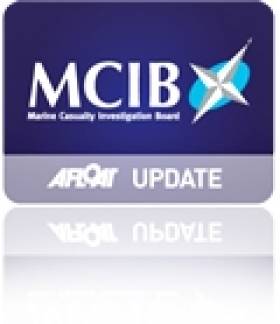Displaying items by tag: Arslan II
Poor Navigation Standards On Container Ship Grounded On Arklow Bank Says MCIB Report
#MCIB - Lack of adherence to standard navigation procedures led to the grounding of a German-owned container ship on the Arklow Bank in January this year, according to the official report into the incident.
As previously reported on Afloat.ie, the MV Arslan II - which was sailing to Belfast from Turkey with a 4,000mt cargo of steel products - was dry-docked at Dublin Port after damaging her rudder on the sandbank some six miles off the Wicklow coast on 14 January.
A familiar visitor to the Irish Sea for more than two decades, mostly under her former name Coastal Isle, the ship was held in Dublin for more than two months while investigators from the Maritime Casualty Investigation Board (MCIB) examined all aspects of the vessel and the circumstances surrounding her grounding.
Their report is highly critical of the management of the 89m cargo ship, noting among other things that a stability calculation was not prepared on departure from her first port of call at Ceuta on the Strait of Gibraltar. Neither were her departure drafts or freeboard recorded in the ship's official log.
Stability proved to be an issue on the voyage, with a copy of the plan in force at the time of the incident showing the master's concerns at the vessel's heavy rolling even in even Force 4 winds.
Weather forecasts of Force 6 to 7 winds prompted the ship's master to alter course on approach to the Arklow Bank in the Irish Sea, seeking shelter from the coast.
But via a combination of outdated charts and incorrect tide tables, over-reliance on GPS over visual navigation cues, and miscommunication between deck officers, the Arslan II passed the southern marker buoy on the wrong side and grounded on the south end of the sandbank.
The MCIB took the ship's master to task for failing to report the grounding incident to the Irish Coast Guard, instead chartering her own tug to tow the vessel to the nearest available port large enough to accommodate her, which was Dublin.
In addition, investigators discovered that this was the second grounding incident for the vessel, following an incident in Scottish waters on the Isle of Bute in July 2012.
The full MCIB report is available to download below.
























































